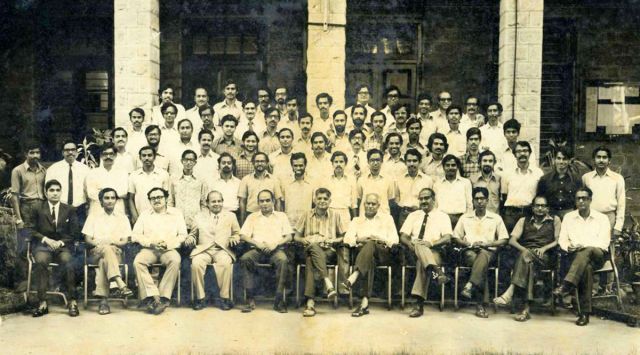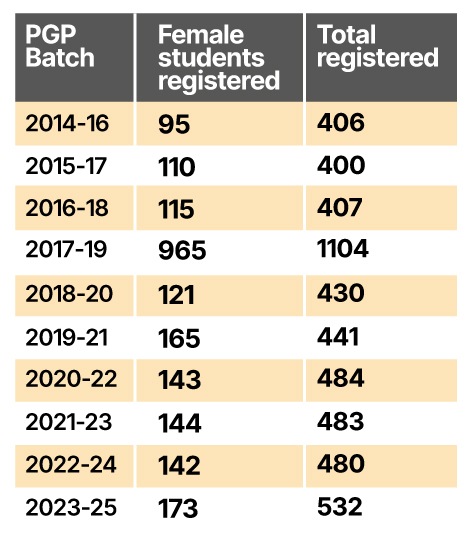The Indian Institute of Management Bangalore (IIMB), one of the leading business schools of India, was the third IIM to be established in 1973, after IIM Calcutta and IIM Ahmedabad. The institute will kickstart its golden jubilee celebrations on Thursday.

In 1973, IIM Bangalore started with the first Post Graduate Programme (PGP) batch of around 50 students. The two-year PGP batch commenced in July 1974 and the first convocation was held on July 10, 1976, with 48 students graduating. In the past 50 years, the institute has grown exponentially and now has around 1,200 students across various degree-granting programmes and 5,000 annual executive education participants. The institute boasts of over 25,000 alumni who occupy positions of global leadership.
Rishikesha T Krishnan, director of IIM Bangalore, joined the institute in 1996 and has since then served it in different capacities. He took charge as the director of the institute on July 20, 2020. He talked to indianexpress.com about IIMB’s contribution to the nation, taking charge during the Covid-19 pandemic, the importance of research and more. Some excerpts from the interview:
Q: You took charge as the director of IIM Bangalore right when the Covid took over the world. How did you manage this challenge?
Krishnan: IIMB was pretty quick in adapting to the challenges posed by the Covid pandemic. We had experience with online education due to MOOC (massive open online course) activities since 2014. Therefore, several faculty members were conversant with what it takes to do effective teaching online.
During the 2020-21 academic year, quite a few courses were offered in the online format. While that particular year was quite badly affected because of the lockdown, the following year (2022) – even as Covid continued – we were able to slowly get back to life on campus. Though some classes were being held online, students were able to attend them from the hostel. Students were able to carry on with other activities in the hostel. Of course, there were disruptions, but I think the positive side is that we were able to adapt quickly and provide a good online learning experience.
Story continues below this ad
Q: IIMB is completing 50 years of inception. Could you please tell us some of the main landmarks of these past five decades?
Krishnan: IIMB was started with a vision to provide managerial talent to drive the public sector. We also tried to create a central focus on other sectors like agriculture, energy, rural development etc as part of the curriculum.
Fast forward to the mid-80s, the philosophy of the country also started changing. The public sector was no longer the focus of all investment and attention. Even though the formal liberalisation process started in 1991, many people believe the seeds of liberalisation were sown a little earlier than that. Reflecting on this, we also became more oriented towards general management and started having a focus on corporate, but certainly in a more explicit way from the early 1990s.
 Old and current campus of IIM Bangalore. (Graphics by Abhishek Mitra. Photo source: IIM Bangalore)
Old and current campus of IIM Bangalore. (Graphics by Abhishek Mitra. Photo source: IIM Bangalore)
We have also tried to use our location in Bengaluru to further the interests of the institute as well as our stakeholders. In 1998, we got into a collaboration with the IT industry and started a weekend MBA programme. The reason for launching this programme was since the IT industry was about to take off, they did not have the strength of management capability which they required to sustain that growth.
Story continues below this ad
Around 2000-2001, we realised that we need to be present in public policy in a different way. After the first 10 years of liberalisation, it was clear while the private sector would drive the economy, there was a need for the government to provide a good regulatory framework, ensure there is a level playing field etc. At that time, IIMB decided to start another new postgraduate programme in Public Policy and Management to create the managerial and policy talent needed to drive policy-making and regulatory activities. This was supported by the Government of India and some external funding agencies like UNDP [United Nations Development Programme].
Somewhere in the middle of the decade, around 2005-2006, we also took a deliberate decision that we needed to enhance both the quality and quantity of research work being done. When the institute started, it focused more on teaching, and though there was research, a lot of it only focused on the sectors which I mentioned earlier.
 Number of women candidates at IIM Bangalore in the past few years.
Number of women candidates at IIM Bangalore in the past few years.
(Graphics by Abhishek Mitra)
So, in 2005-06, we decided to put a greater focus on rigorous academic research, resulting in publications in top journals. The initiatives taken back then were surely successful as now we are widely recognised as a research-intensive management institution in India.
In 2014, IIMB decided to adopt the new emerging technology of digital learning. So we set up a MOOCs platform with edX, a US-based platform started by Harvard and MIT. We became one of the partners of edX and since then we have offered more than 16 different courses on the platform.
Story continues below this ad



 Old and current campus of IIM Bangalore. (Graphics by Abhishek Mitra. Photo source: IIM Bangalore)
Old and current campus of IIM Bangalore. (Graphics by Abhishek Mitra. Photo source: IIM Bangalore) Number of women candidates at IIM Bangalore in the past few years.
Number of women candidates at IIM Bangalore in the past few years. Students of first batch of IIM Bangalore playing ‘tug of war’ the first IIMB campus. (Source: IIM Bangalore)
Students of first batch of IIM Bangalore playing ‘tug of war’ the first IIMB campus. (Source: IIM Bangalore) Spot at IIM Bangalore where a scene of 3 Idiots was shot. (Source: IIM Bangalore)
Spot at IIM Bangalore where a scene of 3 Idiots was shot. (Source: IIM Bangalore) NIRF Rankings of IIM Bangalore over the past few years.
NIRF Rankings of IIM Bangalore over the past few years.





























